12 de noviembre 2018

Children of Exile: The Births “Sowing Hope” in the Camp of Nicaraguan Farmers

PUBLICIDAD 1M
PUBLICIDAD 4D
PUBLICIDAD 5D
Since he was a boy, he wanted to be a police officer. He got his dream, entered the DOEP, and now is being processed as an alleged terrorist.
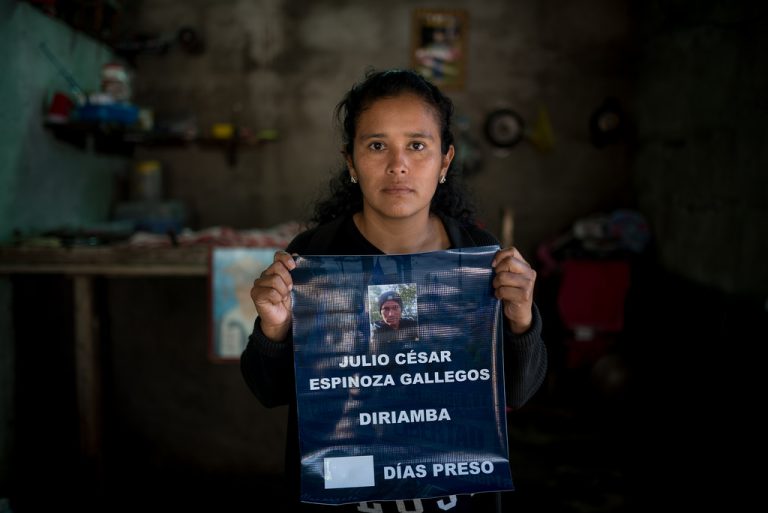
Mildred Quintero holds up a photo of her husband, former cop Julio César Espinoza, now accused of terrorism. Carlos Herrera | Confidential
For Julio Cesar Espinoza, dying has never been an option. He’s young, with a wife and three sons, and five years ago he left a job he hated as a machine operator in the free trade zone, to achieve his dream of joining the police force. All was going well for him: he was finishing his high school diploma and next year he was due for a promotion.
Now, everything has changed. In mid-August, he was arrested by the same Police and sent to a dark, filthy cell in the jail known as El Chipote. Since then, he’s often thought it would be better to die.
Julio Cesar was a non-commissioned officer in the Special Police Operations force. Prior to April, when the citizen protests broke out against Daniel Ortega’s government, he had often guarded those locked in these cells. Now, his family affirms, it’s he who’s the prisoner for crimes he didn’t commit.
In addition to the frustration and humiliation, he feels rage: while serving in the National Police on April 19, he received a blow in the head from a rock thrown at him that is still causing him memory loss, numbness in his legs and seizures. In addition to ignoring his medical needs, the police are accusing him of being a “criminal”, a “terrorist” and a “traitor”.
The police had asked Julio Cesar to identify those who put up the roadblock at Las Esquinas in Carazo, where he lives. He refused. In reprisal, he received a dishonorable discharge and they are now processing him for organized crime, misuse of police attire, aggravated robbery and illegal arms possession. According to the Police, Julio Cesar, together with his brother-in-law Reymundo Lopez and his stepfather Alejandro Bermudez, participated in putting up the roadblock and burning the police station in that community.
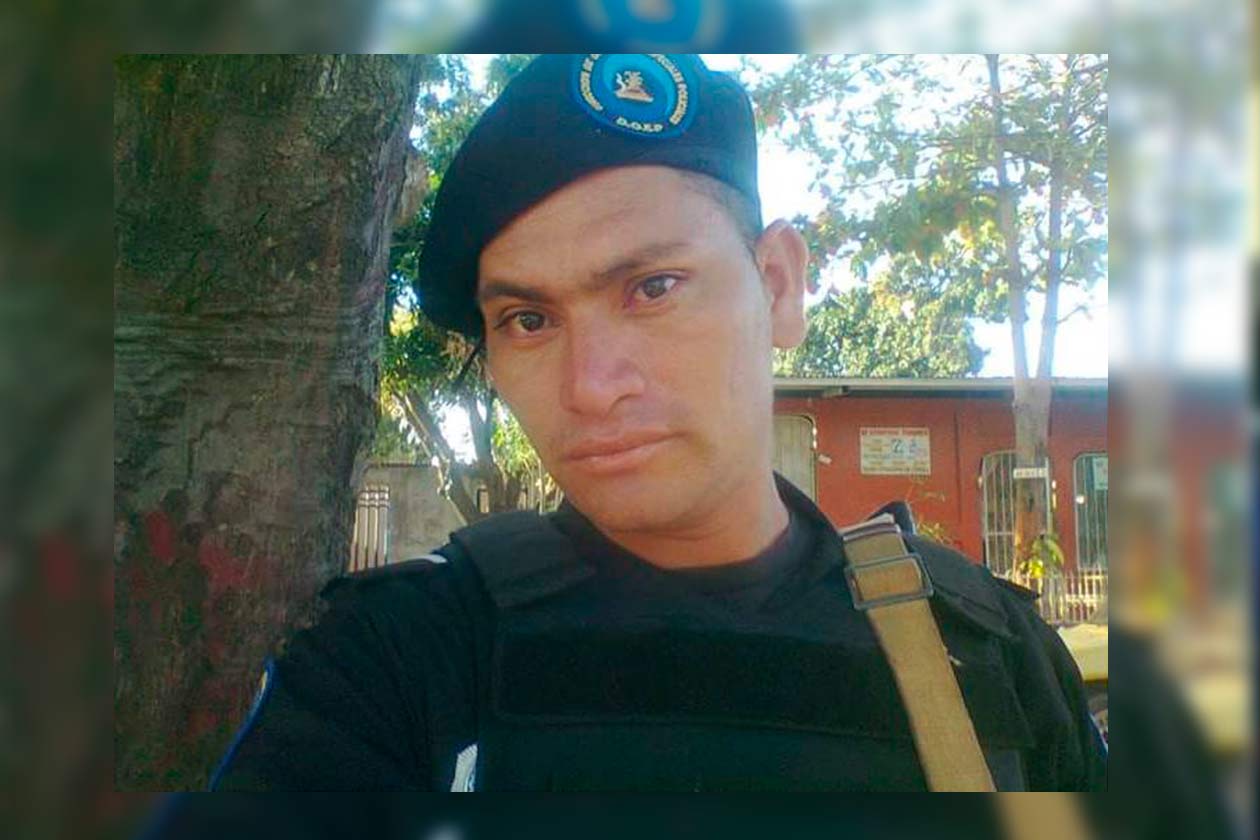
Julio Cesar Espinoza had been a member of the riot squad for five years. Photo: Courtesy / Confidencial
Julio Cesar was about 7 or 8 years old when he began to train the pet dogs in his house, claiming that they were police dogs. From then on, his dream was to be a policeman.
Now 30, Julio is the fourth of six siblings. He was born in the community of Las Esquinas, in the municipality of San Marcos, Carazo, 22 miles from Managua. That’s where he’s always lived. His family has limited resources, and when he was little, he and his brother would sell eggs in the different towns around the department of Carazo. Because of this, he didn’t have the chance to study.
When he became a head of household, he stopped being a peddler and got a job in one of the factories of the free trade zone. He wasn’t happy with that job, but it paid enough to support his family. Until finally, in 2014, he entered the police force.
“A cousin helped him get work with the police. I remember when he told him: ‘Hey, I have a connection for you, so you can get into the police. It’s in the riot squad.’ And that guy [Julio Cesar] was jumping for joy, because that had been his dream. He felt so fulfilled,” his sister Lisseth Espinoza relates.
During the five years that he worked as a member of the riot squad in Managua, Julio Cesar felt proud to be there. “I love being a policeman. I give my all as a member of the police,” he’d say.
Such was his happiness that he didn’t even mind having to leave home for two or three months at a time to serve on missions outside of Managua. For example, he spent last Christmas far from his family in San Carlos, in the department of Rio San Juan. And all his plans were linked to his work with the police.
“He was studying his next-to-last year of high school on Saturdays. The Police gave him permission to travel to his classes when he was away on missions. He was very happy, because he told me: ‘I’m doing well in class…I want to study to get promoted to the higher ranks and not just stay like this’. That was his dream, and now we see his dream cut short, because he’s not in the police nor is he studying,” explains his wife, Mildred Quintero.
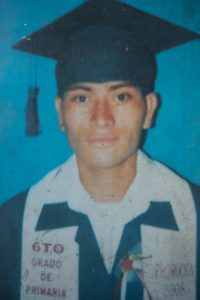
Julio Cesar when he graduated from sixth grade. At the time of his arrest he was one year shy of graduating from high school, taking classes for adults on Saturdays. Photo reproduction: Carlos Herrera
On the night of April 18, Julio Cesar advised his wife that he’d be leaving the next day at three am to head to Masaya, because there was going to be a demonstration there. The demonstrations against the Ortega-Murillo regime were ramping up in a number of cities across the country. Outraged by the repression unleashed against a demonstration of professionals in Managua and a protest held by elder adults in Leon, the university students from both cities, plus dozens of citizens in other places in the country, added their voices to the demands for redress.
Julio Cesar told his wife that he’d call her as soon as he could. The first three deaths – a supermarket worker from Managua, a high school student from Tipitapa, and a police official from the same outfit as Julio Cesar – took place that same night, a death toll that today has reached 325.
Following a confrontation between police and protesting citizens in the Masaya neighborhood of Monimbo, Julio Cesar was hit in the back of the head by a rock. He lost consciousness immediately, and when he came to he had a severe headache. However, in the hospital they told him that his headache was a result of the blow, and they merely prescribed him Diclofenac, an anti-inflammatory.
“Two days following the blow, he once again lost consciousness and couldn’t be revived. The doctors were ready to connect him to life-support because he was unresponsive. When at last he awoke, he didn’t recognize anyone. After that, he was given extended leave to go home and rest. He began to fall down when he walked; he’d be walking, and suddenly his feet would go numb,” Quintero recalls.
Since they didn’t see any improvement, his leave was prolonged from the end of April until August. His problems walking continued, and he also had memory blackouts. The situation was so severe, that he stopped leaving his house for fear of falling.
“He’d be talking and then he’d fall. Once in Diriamba, he was coming towards me with shopping bags, and he fell. After that, he was afraid and stopped going to class. I told the doctor, and he told me that at the next appointment they were going to send him for tests. His appointment was for August 13 and they arrested him on the 10th,” his wife relates.
During the time he was on leave, Julio Cesar continued to follow the crisis that the country was embroiled in. According to his sister, he initially agreed with the repressive tactics that the Police were using. They argued over that many times, but after he saw on the news that the quantity of students and peaceful demonstrators killed had increased to astounding levels, he changed his mind.
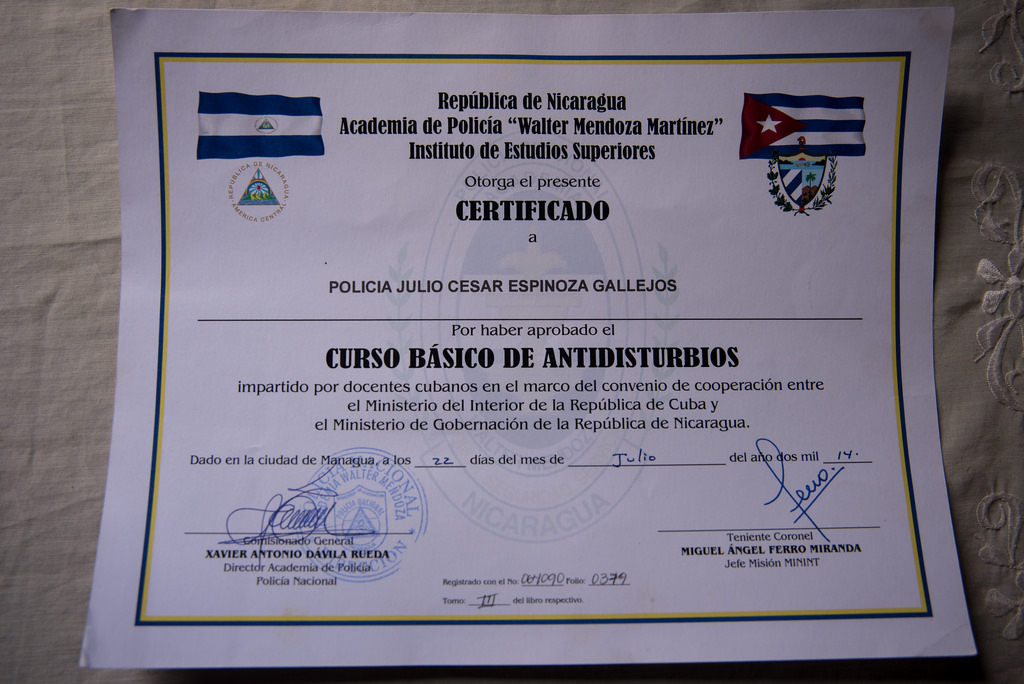
Julio Cesar Espinoza, 30, was a rank and file member of the riot squad. The certificate is from when he completed a basic course to be in that special unit. Reproduction | Carlos Herrera
He also learned that members of the Sandinista Youth were armed, and that those who wanted to resign from the Police were dying or suffering from reprisals.
“I want to put in my resignation, because what’s happening isn’t right. They aren’t armed. Here on earth, maybe that doesn’t count, but before God that’s the worst. I don’t want to kill,” Julio Cesar told his family.
His fear was that if he didn’t shoot, he’d be killed. Despite his poor health, he and his family talked about him fleeing to Costa Rica, but the fear that they’d kill him in-route overcame him, and he didn’t go.
On August 6th, surprised that they hadn’t paid him, Julio Cesar decided to go to the Faustino Ruiz Police Station to find out if he’d been discharged. He went in his police uniform, but when he arrived, they told him they needed to speak with him and took him to a room.
“We’re going to give you a chance,” the agents from the “Judicial Aid” agency who were interrogating him said.
Julio Cesar was perplexed, because he didn’t understand what was going on. He thought that maybe they’d given him a discharge for having spent so much time on leave.
“Who are the people in charge of the roadblock?” [at Las Esquinas, where he lived] they asked him abruptly.
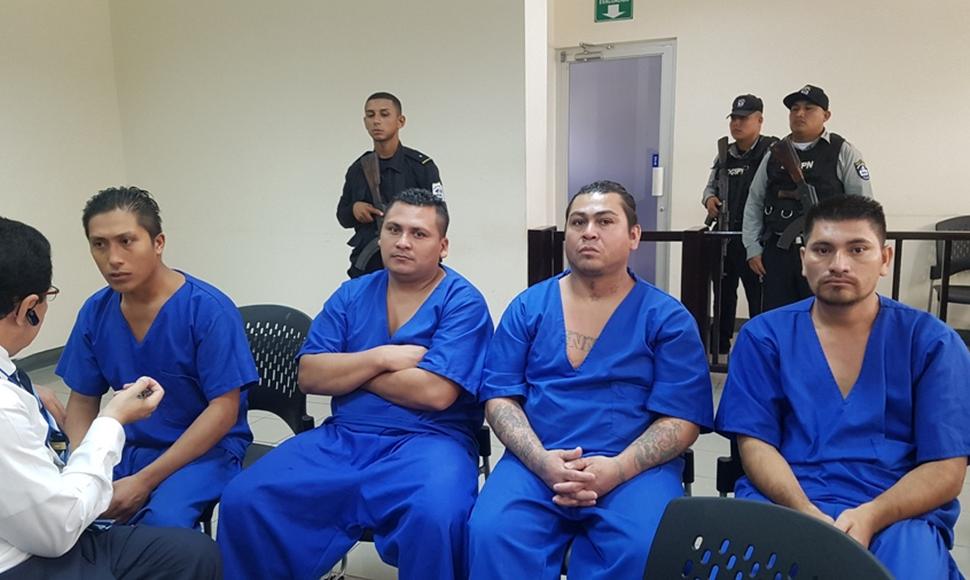
Julio Cesar Espinoza (r) at the court hearing on November 5th.
“I don’t know. I wasn’t at the roadblocks,” he responded with astonishment.
“You were there, and we have proof. Who’s financing them?” they insisted.
“I don’t know anything. I can’t leave my house. I’m a policeman, I was afraid,” he told them.
Since they didn’t get the information they wanted, they told him to go by the office, because “you’re discharged, effective immediately.”
He answered: “That’s okay, but give me a receipt saying that I’ve turned everything in.”
Four days later, they came to his house and took him to jail, together with his mother, his sister, a brother-in-law, his stepfather and a neighbor. Of the group, only the two women have been freed.
“Since I’m a vendor, we’d go out in our vehicles to sell and we’d leave food and soda for the kids at the roadblock so they’d let us go by. There were people that saw this and they were the ones that reported us. Those two or three sales trips that I made during the eight days that the roadblock lasted ended up costing me dearly, because now they’re all in jail,” laments Lisseth Espinoza, Julio Cesar’s sister.
Hours after being detained in Carazo, Julio Cesar and his family members were transferred to the cells of the El Chipote jail. They were put into punishment cells, stripped of their clothing and forced to do sit-ups. They were then interrogated several times during the early hours of the morning and they suffered insults.
“I was desperate. I felt like I was going to die. I wanted to die,” Julio Cesar later told his wife.
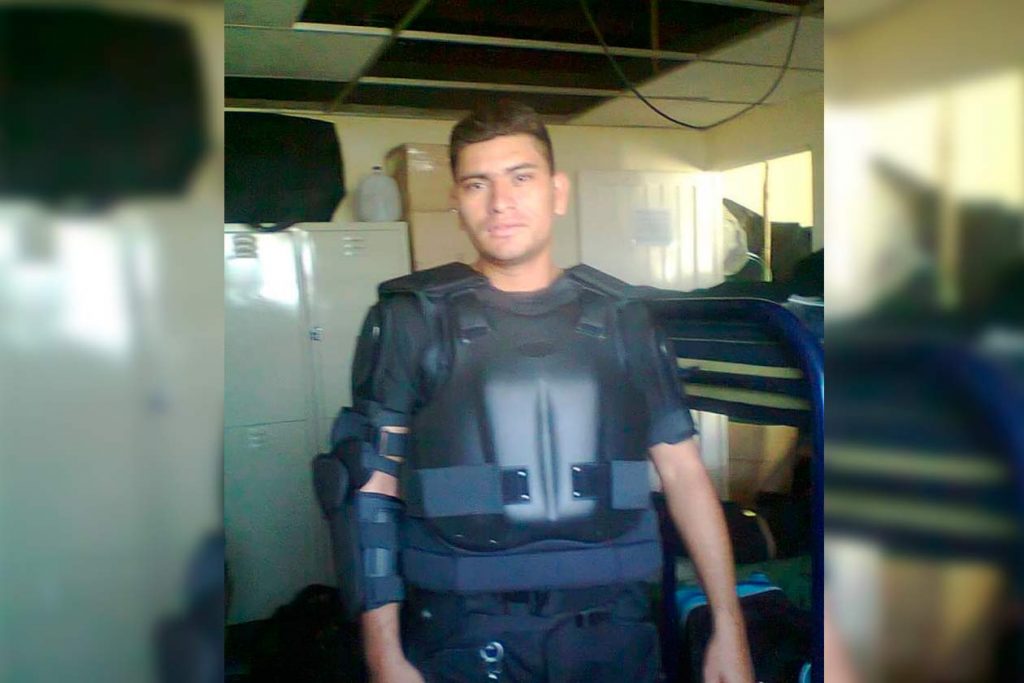
Julio Cesar wanted to continue studying his police career with hopes of moving up the ladder. Photo: Cortesy / Confidencial
His sister Lisseth states that her husband, Reymundo Lopez, has also been tortured. He “was taken to a tiny torture cell where there was water dripping on all sides, and there was so much water that it reached his knees. And that man didn’t sleep for four days. When we saw him in Tipitapa, that man was crying and he said, ‘God, got me out of there (the El Chipote jail).’”
They also demanded that Reymond confess who had financed the roadblock. Since he said that he didn’t know, they threatened to “do horrible things” to his daughters. “You’ll talk when we bring the photos of what we’re doing to your family member,” they said menacingly.
Julio Cesar’s health has worsened. He’s had several seizures in the La Modelo jail where he’s now being held, but the Military Hospital has refused to pass on the medical record that shows the seriousness of his illness. The jail officials are also refusing to let him have the medications his family bring him.
“The last time we saw him (at the beginning of October), we learned that he’d had convulsions. The prisoners made a ruckus because no one came to see. A prisoner who was a paramedic was the one to revive him, because he didn’t come to. After this convulsion, he got worse,” assures his wife, Mildred Quintero.
The trial of Julio Cesar and his family members began on November 5th. The Prosecution announced that they would provide proof in the form of four witnesses, including an undercover policeman.
“If it’s God’s will that he be there (in jail), it’s something we haven’t accepted as a family. We haven’t accepted that God has a plan, perhaps so that he can’t kill anyone, because maybe if he had returned from leave they were going to send him to keep doing disastrous things. That’s the only way that God could be allowing this,” his sister Lisseth says visibly shaken.
Archivado como:
PUBLICIDAD 3M
Confidencial es un diario digital nicaragüense, de formato multimedia, fundado por Carlos F. Chamorro en junio de 1996.
PUBLICIDAD 3D